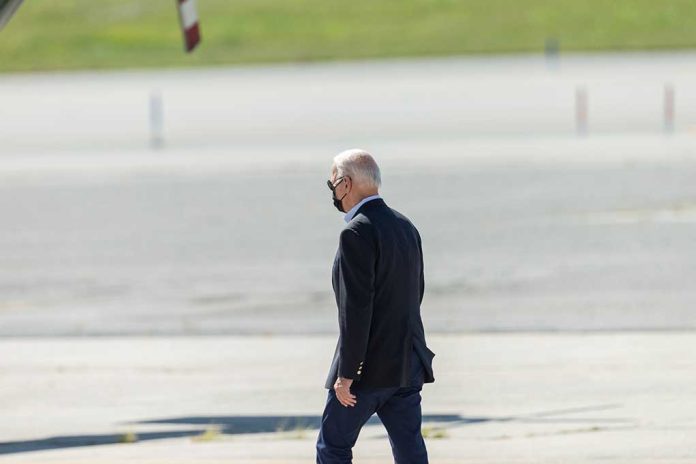
President Biden announces a $2.4 billion aid package for Ukraine, sparking criticism from former President Trump and raising questions about the future of U.S. support for the war-torn nation.
At a Glance
- Biden authorizes $2.4 billion in new security assistance for Ukraine
- The package includes drones, ammunition, and air defense systems
- Trump criticizes the aid and claims he could negotiate peace if re-elected
- Zelensky makes urgent appeal for continued American support
- Republicans express concerns about Zelensky’s involvement in U.S. politics
Biden Bolsters Ukraine Support with New Aid Package
In a significant White House meeting, President Joe Biden unveiled a new $2.4 billion security assistance package for Ukraine, reaffirming the United States’ commitment to supporting the nation’s defense against Russian aggression. The announcement came during Ukrainian President Volodymyr Zelensky’s visit, which was seen as a crucial opportunity to secure continued American backing.
The aid package, to be administered by the Pentagon, includes vital military equipment such as drones, ammunition, and air defense systems. Biden has directed the allocation of all remaining congressionally approved security assistance funding to Ukraine by the end of his term on January 20. This move aims to ensure Ukraine receives substantial support before any potential changes in U.S. foreign policy following the upcoming election.
President Biden & Volodymyr Zelenskiy, Ukraine's president, in the Oval Office on Thursday.
Biden announced $2.4 billion in military assistance for Ukraine & plans to convene a leader-level meeting of key allies to coordinate additional support when he visits Germany next month. pic.twitter.com/y6f9tnX8jf
— Al Drago (@Al_Drago) September 26, 2024
Zelensky’s Urgent Appeal and Congressional Support
During his visit, President Zelensky made an impassioned plea for additional American aid and weapons. His appeal is viewed as one of his final opportunities to persuade President Biden and Vice President Kamala Harris to maintain robust support for Ukraine’s defense efforts. Zelensky’s urgency is underscored by the ongoing conflict and the need for sustained international backing.
“There are some in my country who would instead force Ukraine to give up large parts of its sovereign territory,” Ms. Harris said, “who would demand that Ukraine accept neutrality and would require Ukraine to forgo security relationships with other nations.”
Bipartisan majorities in Congress have shown strong support for Ukraine, approving $175 billion in aid since February 2022. However, as of August, about $20.1 billion of military aid remained unspent, with another $58.4 billion committed to various projects. This substantial financial commitment underscores the complexity of managing and distributing aid effectively.
Trump’s Criticism and Alternative Approach
Former President Donald Trump has been vocal in his criticism of the Biden administration’s strategy in the Ukraine conflict. Trump claims he could negotiate peace if he wins the next election, presenting a markedly different perspective on U.S. foreign policy regarding Ukraine. This stance has led to tensions between Trump and Zelensky, with the former president suggesting a swift negotiation that the Ukrainian leader fears could result in territorial concessions to Russia.
In a controversial move, Trump publicized a private letter from Zelensky that suggested a meeting, appearing to be an attempt to mend their relationship. This action has further complicated the diplomatic landscape and raised questions about the potential future of U.S.-Ukraine relations under different leadership.
President Joe Biden announces $2.4 billion in military assistance for Ukraine on Thursday and plans to convene a leader-level meeting of key allies to coordinate additional support when he visits Germany next month https://t.co/s3vyG0JbHt
— Bloomberg (@business) September 26, 2024
Republican Concerns and White House Response
Some Republican leaders, including House Speaker Mike Johnson and Oversight Committee chairman James Comer, have expressed concerns about Zelensky’s involvement in U.S. politics. They particularly criticized the Ukrainian president’s appearance at an ammunition factory in Scranton, Pennsylvania, viewing it as potential interference in the upcoming U.S. election.
White House press secretary Karine Jean-Pierre dismissed these criticisms, stating that the visit was requested by the Ukrainian delegation. This response highlights the delicate balance the administration must maintain between supporting an ally and addressing domestic political concerns.
As the situation continues to evolve, the future of U.S. support for Ukraine remains a central issue in both foreign policy discussions and the upcoming presidential election. The contrasting approaches of the current and former administrations underscore the potential for significant shifts in America’s role in the ongoing conflict, depending on the outcome of the next election.
Sources:
- Zelensky Pleads for More U.S. Weapons in Meetings With Biden and Harris
- Trump to meet Ukraine’s Zelenskiy after Harris pledges support
- Biden orders Pentagon to drain billions in unspent Ukraine aid as Trump-Zelensky relationship sours further
- Trump to Meet Ukraine’s Zelenskiy After Harris Pledges Support
- Zelensky Presses Case for Missile Strikes, Tries to Patch Up GOP Support
- Harris Assails Trump for Pushing Ukraine to Negotiate With Putin














